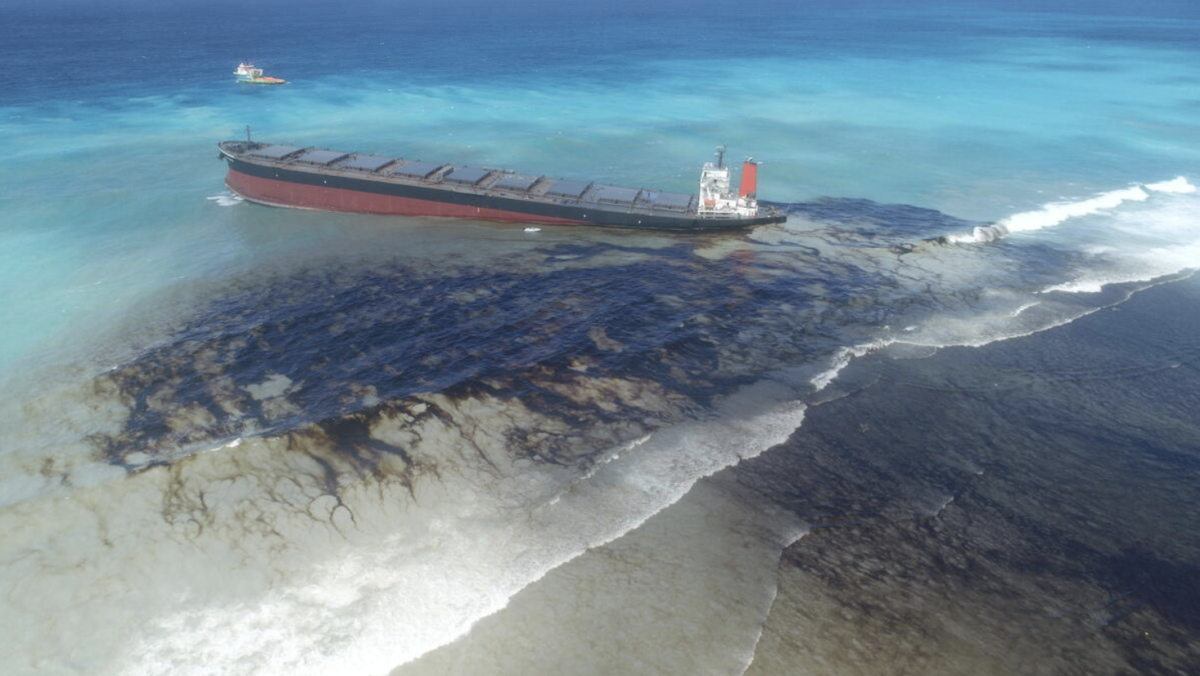Mauritius possesses a rich ecological profile, particularly when it comes to endemic species that result from the age of the island nation and its isolation and volcanic origins. High levels of species diversity have unfortunately coexisted with a history of loss, including the extinction of the dodo and lesser-known species such as the Red Rail and the Blue Parrot, and of other plant species.
The recent oil spill has had a doubly tragic impact on Mauritius, on the local biodiversity and the populace, who treasure the sea with a tenderness that cuts across class, ethnicity and age. The oil spill occurred when a Japanese owned bulk carrier, the MV Wakashio, crashed after striking a coral reef on the southeast coast enroute to Brazil. The ship had been on a dangerously close course to the reef, and subsequently ran aground at Pointe d’Esny, a lagoon, on the 25th of July. Twelve days later, on the 6th of August, heavy fuel oil began leaking out of the ship, devastating the reef and the coastal communities who relied on the reef for their livelihoods.
The MV Wakashio had been carrying 4000 tonnes of oil, 1000 of which was thought to have leaked out into the lagoon, just a few kilometers from Mahébourg, a small village situated on the southeast coast of Mauritius. The size of the spill may not have been as large as ones that have occurred previously in other parts of the world, but the location is crucial—this lagoon houses the Blue Bay Marine Park. It is home to 38 species of coral, mangrove forests that populate rare wetlands, and the nature reserve of Ile aux Aigrettes, a coral islet containing rare plants, reptiles and birds. As Mauritian freelance journalist Khalil Cassimally stated, the devastation to the local ecosystems and communities should be classed as an ‘ecocide’.
Thousands of species were at risk of “drowning in a sea of pollution, with dire consequences for Mauritius’ economy, food security and health,” Greenpeace’s climate and energy manager, Happy Khambule, told Al Jazeera. However, the devastation acted as a catalyst to mobilize the tight-knit community on Mahébourg who, with the aid of some volunteers, began building “sorbent booms” to slow the oil spill’s spread.
The booms were constructed of chains of stretch nets filled with dried sugarcane that acted as barriers to trap oil in their fibers. More volunteers gathered in malls and public spaces across the island to construct these booms, and sent off more than 400 yards of them off the southeastern coast of the island near the site of the wreck in the Grand Port Lagoon. Mobilization would prove to be the catalyst of a chain of popular protests that would demand not only the resignation of the current prime minister, Pravind Jugnauth, but also the reshuffling of Mauritius’ entire political establishment. The catastrophe rallied Mauritians to protect the sea, which they see as common ground.
The context behind these protests is important in understanding the anger at the government’s slow response. According to Ariel Saramandi’s timeline on the #MauritiusOilSpill newsletter, on August 6th, the government stated that volunteers were not allowed near the site of the oil spill and could face potential imprisonment and a substantial fine. The government only declared a state of environmental emergency on August 7th. Furthermore, on August 12th, Prime Minister Jugnauth defended the government’s handling of the incident and during an interview with the BBC, refused to apologize to the people of Mauritius. There has also been a crackdown on the media starting with police barring journalists with the media outlets l’express and TopFM from attending a press conference by the Prime Minister, who led the Militant Socialist Movement Party since 2003. These media outlets had a prior history of criticizing the government.
The crackdown arguably intensified on the 13th of August, when police officers again prevented journalists from attending a press conference given by opposition leader and Member of Parliament for the Labour Party Dr. Arvin Boolell. Boolell eventually held the conference in a public space near a police station. On the same day, BBC World News channel and over-the-air broadcast shows stopped showing for a few hours and instead, CGTN, a Chinese news station played. This coincided with the airing on the BBC World Service of an interview with former prime minister and leader of the Labour Party, now in opposition, Dr. Navin Ramgoolam.
On August 15th, police officers allegedly confronted volunteers and “Rezistans ek Alternative” activists—members of a left-wing, anti-establishment party who largely coordinated the volunteers previously—hoping to disband them. They later recouped at Mahébourg and police apparently ceased action when the activists began contacting radio stations.
The reactionary movements of citizens, seeds of frustration with the government’s slow action, and the crackdown on freedom of press and speech have catalyzed resentment stemming from abuses of power and lack of effective governance. The spark finally caught fire and a massive protest occurred on the 29th of August with around 100,000 protesters taking to the streets of the capital Port Louis. Protesters answered the call of Bruneau Laurette, a social activist and maritime security expert. He had been vocal in his criticism of the government’s inaction on social media, asking the question that was on many Mauritians’ minds: why the inaction? Marchers dressed in black and held placards embellished with drawings of dolphins, a reference to those found dead in the wake of the oil spill, as well as signs stating ‘citoyen leve citoyen’ (citizens wake up citizens, in Mauritian Creole). They waved flags and chanted ‘bour il dehor’ (throw him out!). Behind the march was Rezistans ek Alternative, which mobilized another march at Mahébourg just two weeks after the Port Louis march. The march was the largest demonstration that occurred in this region and fast tracked the party into a place of political prominence.
Although the established political parties, the Mauritius Labor Party, and the Militant Socialist Movement (MSM), which formed after a split from the Mauritian Militant Movement, had radical, leftwing grassroots origins, they quickly became enmeshed in the political landscape. They formed coalitions to guarantee elections most times, and slowly abandoned their founding ideals in the interest of the small oligarchy that constitutes most of the private sector. This began to alienate people, and as alleged corruption scandals and nepotism began to increase, the populace’s distrust grew. Just in June, Prime Minister Jugnauth fired his deputy, Ivan Collendavelloo due to alleged corruption involving a power generation project.
The sea has acted as a unifying factor across the political and ethnic divisions, as Mauritians feel their cultural identity is strongly tied to the sea. The inheritance of a collective loss will not be ignored, and the atmosphere is hopeful that the movement will not fizzle out. Mahébourg, where the movement originated, has become a hub of citizen activity and open assemblies where people can share what’s on their mind and their thoughts on the political situation. Rezistans ek Alternative, the left-wing party made up largely of social and environmental activists as well as trade unionists, is the driving force behind this. The ecocide has spurred reactivism in Mauritian politics which does not seem to be dying out.
Sources:
A Cassimally, K. (2020). ‘If they fall, we all fall’: The ecocide that sparked a revolution in Mauritius. The Independent. Retrieved 19 October 2020, from https://www.independent.co.uk/independentpremium/long-reads/mauritius-oil-spill-news-ecocide-mahebourg-revolution-b447771.html.
Saramandi, A. (2020). Makeshift ‘booms’ and human hair: Citizen-led oil clean-up efforts continue in Mauritius. NBC News. Retrieved 19 October 2020, from https://www.nbcnews.com/news/world/mauritius-residents-join-efforts-contain-oil-spill-grounded-ship-splits-n1236868.
Saramandi, A. (2020). In Mauritius, we march, we protest. Mauritius.substack.com. Retrieved 19 October 2020, from https://mauritius.substack.com/p/we-march-we-protest.
Croucher, R., & McIlroy, J. (2013). Mauritius 1938: the origins of a milestone in colonial trade union legislation. Labor History, 54(3), 223-239. https://doi.org/10.1080/0023656x.2013.804268
Cassimally, K. (2020). Mauritius oil spill: make ecocide law and send the powerful to jail. Mauritius.substack.com. Retrieved 19 October 2020, from https://mauritius.substack.com/p/make-ecocide-law-and-send-the-powerful.
Singh Khadka, N. (2020). Why the Mauritius oil spill is so serious. BBC News. Retrieved 19 October 2020, from https://www.bbc.com/news/world-africa-53754751.
The Mauritius Oil Spill Cannot Be Cleaned Up, but Damages Must Be Paid. EcoWatch. (2020). Retrieved 27 October 2020, from https://www.ecowatch.com/mauritius-oil-spill-damages-2648116836.html?rebelltitem=1#rebelltitem1.
Cassimally, K. (2020). 100,000 march in Mauritius after oil spill kills dolphins. The Independent. Retrieved 27 October 2020, from https://www.independent.co.uk/news/world/africa/mauritius-oil-spill-protests-dolphins-dead-port-louis-a9695591.html.
Cassimally, K. (2020). Mauritians Launch Rescue to Save Wildlife from Oil Spill. Scientific American. Retrieved 26 October 2020, from https://www.scientificamerican.com/article/mauritians-launch-rescue-to-save-wildlife-from-oil-spill/.
Bhuckory, K. (2020). Mauritian Prime Minister Fires Deputy Over Corruption Report. Bloomberg.com. Retrieved 27 October 2020, from https://www.bloomberg.com/news/articles/2020-06-25/mauritian-prime-minister-fires-deputy-over-corruption-report.
The Mauritius Oil Spill Cannot Be Cleaned Up, but Damages Must Be Paid. EcoWatch. (2020). Retrieved 27 October 2020, from https://www.ecowatch.com/mauritius-oil-spill-damages-2648116836.html?rebelltitem=1#rebelltitem1.
Saramandi, A. (2020). Makeshift ‘booms’ and human hair: Citizen-led oil clean-up efforts continue in Mauritius. NBC News. Retrieved 27 October 2020, from https://www.nbcnews.com/news/world/mauritius-residents-join-efforts-contain-oil-spill-grounded-ship-splits-n1236868.
Clark, N. (2020). Mauritius oil spill: An alarm bell for environmental safety. Aljazeera.com. Retrieved 27 October 2020, from https://www.aljazeera.com/features/2020/08/13/mauritius-oil-spill-an-alarm-bell-for-environmental-safety/?gb=true.

